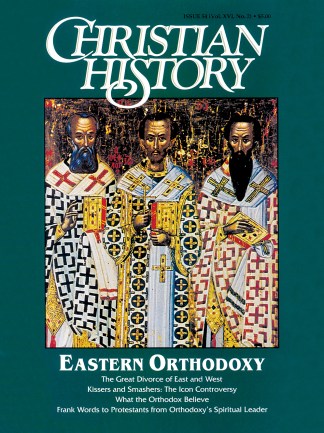In the decades following the sack of Constantinople, political events conspired to prompt the Eastern church to seek reunion with the West.
Michael VIII (reigned 1259-82), the emperor who recovered Constantinople from the Catholics, made the first attempt. He primarily desired political protection; he was militarily threatened by Charles of Anjou, sovereign of Sicily, and he desperately needed the papacy’s protection.
At a council held at Lyons in 1274, the Orthodox delegates agreed to recognize the papal claims and to recite the Creed with the filioque.
But the union was fiercely rejected by the overwhelming majority of Orthodox clergy and laity. The emperor’s sister summed up the Greek attitude: “Better that my brother’s empire should perish than the purity of the Orthodox faith.” The union of Lyons was formally repudiated by Michael’s successor.
Powerless agreement
A second reunion council was held at Florence in 1438-9. This time Emperor John VIII (reigned 1425-48) attended, together with the patriarch of Constantinople and a large delegation from a number of Orthodox churches. A genuine attempt was made by both sides to reach a true agreement.
The Greeks knew their political situation had become desperate. The only hope of defeating the Turks lay in help from the West. Eventually an agreement was drawn up, which was signed by nearly all the Orthodox present.
The Florentine Union sought unanimity in doctrine but respect for the traditions peculiar to each church. Thus the Orthodox accepted the papal claims (though the wording was ambiguous), the filioque (though they weren’t required to insert the phrase into their reciting of the Creed), and the doctrine of purgatory (a relatively new point of contention). Greeks were allowed to use leavened bread, while Latins were to continue to employ unleavened.
The Union of Florence was celebrated throughout western Europe; bells were rung in all the parish churches of England. But it proved no more of a reality in the East than its predecessor at Lyons. John VIII and his successor, Constantine XI (the last emperor of Byzantium), were powerless to enforce it on their subjects. They did not even dare to proclaim it publicly at Constantinople for 13 years. Many who signed at Florence revoked their signatures when they reached home.
The council’s decrees were never accepted by more than a tiny fraction of Orthodox clergy and people. The Grand Duke Lucas Notaras, echoing the words of the emperor’s sister after Lyons, remarked, “I would rather see the Muslim turban in the midst of the city than the Latin miter.”
Copyright © 1997 by the author or Christianity Today/Christian History magazine. Click here for reprint information on Christian History.










